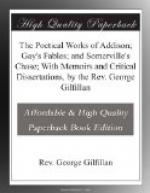What tongue, what words of rapture, can
express
A vision so profuse of pleasantness!
Oh, had the poet ne’er profaned his pen,
80
To varnish o’er the guilt of faithless men,
His other works might have deserved applause;
But now the language can’t support the cause;
While the clean current, though serene and bright,
Betrays a bottom odious to the sight.
But now, my Muse, a softer strain rehearse,
Turn every line with art, and smooth thy verse;
The courtly Waller next commands thy lays:
Muse, tune thy verse with art to Waller’s praise.
While tender airs and lovely dames inspire
90
Soft melting thoughts, and propagate desire;
So long shall Waller’s strains our passion move,
And Sacharissa’s beauties kindle love.
Thy verse, harmonious bard, and flattering song,
Can make the vanquished great, the coward strong.
Thy verse can show even Cromwell’s innocence,
And compliment the storms that bore him hence.
Oh, had thy Muse not come an age too soon,
But seen great Nassau on the British throne,
How had his triumphs glittered in thy page,
100
And warmed thee to a more exalted rage!
What scenes of death and horror had we view’d,
And how had Boyne’s wide current reeked in blood!
Or, if Maria’s charms thou wouldst rehearse,
In smoother numbers and a softer verse,
Thy pen had well described her graceful air,
And Gloriana would have seemed more fair.
Nor must Roscommon pass neglected by,
That makes even rules a noble poetry:
Rules, whose deep sense and heavenly numbers show
110
The best of critics, and of poets too.
Nor, Denham, must we e’er forget thy strains,
While Cooper’s Hill commands the neighbouring plains.
But see where artful Dryden next appears,
Grown old in rhyme, but charming even in years.
Great Dryden next, whose tuneful Muse affords
The sweetest numbers, and the fittest words.
Whether in comic sounds or tragic airs
She forms her voice, she moves our smiles or tears.
If satire or heroic strains she writes,
120
Her hero pleases and her satire bites.
From her no harsh unartful numbers fall,
She wears all dresses, and she charms in all.
How might we fear our English poetry,
That long has flourished, should decay with thee;
Did not the Muses’ other hope appear,
Harmonious Congreve, and forbid our fear:
Congreve! whose fancy’s unexhausted store
Has given already much, and promised more.
Congreve shall still preserve thy fame alive,
130
And Dryden’s Muse shall in his friend survive.
I’m tired with rhyming, and would fain give o’er,
But justice still demands one labour more:
The noble Montague remains unnamed,
For wit, for humour, and for judgment
A vision so profuse of pleasantness!
Oh, had the poet ne’er profaned his pen,
80
To varnish o’er the guilt of faithless men,
His other works might have deserved applause;
But now the language can’t support the cause;
While the clean current, though serene and bright,
Betrays a bottom odious to the sight.
But now, my Muse, a softer strain rehearse,
Turn every line with art, and smooth thy verse;
The courtly Waller next commands thy lays:
Muse, tune thy verse with art to Waller’s praise.
While tender airs and lovely dames inspire
90
Soft melting thoughts, and propagate desire;
So long shall Waller’s strains our passion move,
And Sacharissa’s beauties kindle love.
Thy verse, harmonious bard, and flattering song,
Can make the vanquished great, the coward strong.
Thy verse can show even Cromwell’s innocence,
And compliment the storms that bore him hence.
Oh, had thy Muse not come an age too soon,
But seen great Nassau on the British throne,
How had his triumphs glittered in thy page,
100
And warmed thee to a more exalted rage!
What scenes of death and horror had we view’d,
And how had Boyne’s wide current reeked in blood!
Or, if Maria’s charms thou wouldst rehearse,
In smoother numbers and a softer verse,
Thy pen had well described her graceful air,
And Gloriana would have seemed more fair.
Nor must Roscommon pass neglected by,
That makes even rules a noble poetry:
Rules, whose deep sense and heavenly numbers show
110
The best of critics, and of poets too.
Nor, Denham, must we e’er forget thy strains,
While Cooper’s Hill commands the neighbouring plains.
But see where artful Dryden next appears,
Grown old in rhyme, but charming even in years.
Great Dryden next, whose tuneful Muse affords
The sweetest numbers, and the fittest words.
Whether in comic sounds or tragic airs
She forms her voice, she moves our smiles or tears.
If satire or heroic strains she writes,
120
Her hero pleases and her satire bites.
From her no harsh unartful numbers fall,
She wears all dresses, and she charms in all.
How might we fear our English poetry,
That long has flourished, should decay with thee;
Did not the Muses’ other hope appear,
Harmonious Congreve, and forbid our fear:
Congreve! whose fancy’s unexhausted store
Has given already much, and promised more.
Congreve shall still preserve thy fame alive,
130
And Dryden’s Muse shall in his friend survive.
I’m tired with rhyming, and would fain give o’er,
But justice still demands one labour more:
The noble Montague remains unnamed,
For wit, for humour, and for judgment




